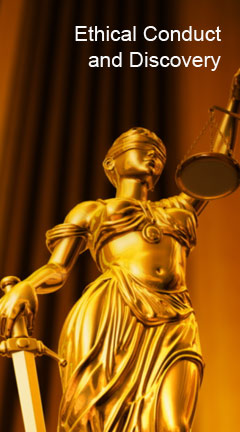Aviso de archivo
Esta es una página de archivo que ya no se actualiza. Puede contener información desactualizada y es posible que los enlaces ya no funcionen como se pretendía originalmente.
Home | Glossary | Resources | Help | Course Map
Finally, the expert should be familiar with the rules of ethical conduct required of experts and attorneys. Experts must be in compliance with those rules at all times. Before the expert undertakes a role in the discovery process, he must know about the case. The expert should have at least enough information for a preliminary report and should have worked through the investigative process to that point before he can be of value in the discovery effort.
The expert should have done as much fact gathering, such as evidence testing, as is available to him from all sources but the opposing party. The expert who has followed his scientifically prescribed testing process correctly will be in a good position to render meaningful assistance at this stage of discovery.
Additional Online Courses
- What Every First Responding Officer Should Know About DNA Evidence
- Collecting DNA Evidence at Property Crime Scenes
- DNA – A Prosecutor’s Practice Notebook
- Crime Scene and DNA Basics
- Laboratory Safety Programs
- DNA Amplification
- Population Genetics and Statistics
- Non-STR DNA Markers: SNPs, Y-STRs, LCN and mtDNA
- Firearms Examiner Training
- Forensic DNA Education for Law Enforcement Decisionmakers
- What Every Investigator and Evidence Technician Should Know About DNA Evidence
- Principles of Forensic DNA for Officers of the Court
- Law 101: Legal Guide for the Forensic Expert
- Laboratory Orientation and Testing of Body Fluids and Tissues
- DNA Extraction and Quantitation
- STR Data Analysis and Interpretation
- Communication Skills, Report Writing, and Courtroom Testimony
- Español for Law Enforcement
- Amplified DNA Product Separation for Forensic Analysts


